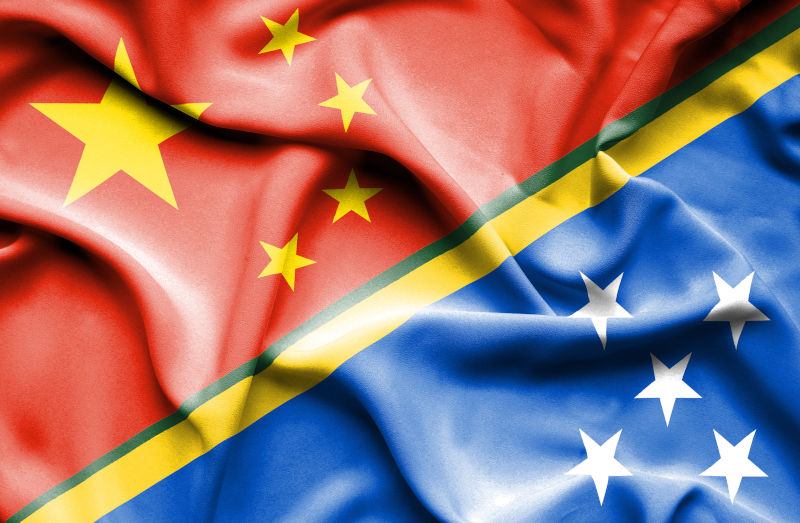In the last few years, Australian and US foreign policy toward the Pacific has been framed as a benign influence, couched in money terms, offers and suasion. But in such offers comes that bit of intrusive steel, a less than subtle threat that gravitating into the orbit of another power, most notably China, will come with costs.
Say what you want about the Solomon Islands’ Manasseh Sogavare, be it his oily disposition, his generous misreading of certain facts and his obsession with clinging on to power. But in the colourful, untidy mix, also include the fact that he has done more than any other Pacific Island state to tear down the façade of Australia’s condescending generosity towards both his country and those of his neighbours. Much the same can be said about the United States, whose diplomatic corps has been stung into action by Beijing’s greater presence in the Pacific.
The Solomon Islands-China security pact is very much a case in point, nipping away at the Canberra-Washington consensus of keeping Pacific states aligned with the Anglosphere. It has caused no measure of consternation, inciting a flurry of flights to Honiara from both capitals. More excitement was caused on Sogavare’s return from his latest visit to China. At a news conference in Honiara, the PM revealed that he had signed no fewer than nine agreements and memoranda with his hosts, including a police cooperation plan.
The SI-PRC Police Cooperation agreement, to be implemented over a three-year period between this year and 2025, effectively sidelines what has been seen in Canberra as its traditional role. As the Solomon Islands government notes, the agreement is intended to “further strengthen the capability of the Royal Solomon Islands Police Force (RSIPF) across various areas.” This was, the statement goes on to say, “critical for managing the country’s domestic security affairs and has nothing to do with the ongoing geopolitical bickering by some of the country’s traditional allies.”
The plan will include “various trainings [sic], capacity building initiatives and equipment for RSIPF”, including such areas as public emergency responses, the establishment of Digital Communication Systems, traffic control, cyber security, major event security protection and infrastructure construction.
Sogavare also made special mention that neither the US nor Australia had anything “to fear from the police cooperation agreement with China.” The cooperation with Beijing is intended to complement existing Australian and New Zealand police programs, though there is little doubt that Sogavare is poking fun at his detractors.
A constant theme running through the approach to the Solomon Islands from Australia and the US has been an irritating, grating paternalism. Treated as hapless children, such states can only ever hope to be guided and potty trained. Independence can only ever be in name. Growth and maturity can only ever take place, if ever, in stilted fashion. And tellingly, children need to be supervised, a point made rather pointedly by the Biden administration’s opening of an embassy in the Pacific Island state.
Australia’s Foreign Minister, Penny Wong, has also reiterated the theme. After her latest meeting with Beijing’s top diplomat Wang Yi in Jakarta, Wong reached that fairly stale, if predictable conclusion: “We take the view, along with other members of the Pacific Island Forum… that security is best provided for within the Pacific family.”
With almost spanking derision, Wong suggested that “countries make their sovereign decisions, however the security of the Pacific is something that we all have an interest in, so we urge there to be transparency.”
This astounding declaration comes from a minister who remains reticent and opaque about numerous security details regarding AUKUS, her country’s own security pact with the United States and the United Kingdom. Certain details are positively dying to be revealed. A few are worth mentioning, including how US military personnel are to be deployed in the Australian north; whether Australia would be obligated to intervene in a war over Taiwan; and whether nuclear weapons are being transitioned through Australian military and naval sites.
Wong’s remarks have justifiably incensed Sogavare. “The narrow and coercive diplomatic approach of targeting China-Solomon Islands relations, and I want to use this word, is unneighbourly … this is nothing but interference of foreign states in the internal affairs of Solomon Islands.” In contrast, “China has not invaded or colonised any other nation-state.”
In a latest development, Sogavare is insisting that Australia is lagging in its promises to provide propping funding to his country’s stuttering budget. Initially, claims the PM, Australia and New Zealand had promised in the order of $12 and $15 million respectively. (He did not state in what currency form they were in.)
“Some of our donor partners who have committed to providing budget support to us this year have since changed their position and delayed their assistance for us and we are struggling to finance the 2023 budget.” Having been left in a “predicament”, Sogavare was “glad to announce and delighted to announce [that] the People’s Republic of China have really stepped up to provide this budget support needed for 2023.”
The Australian Department of Foreign Affairs and Trade (DFAT) had a different interpretation, claiming in a statement that Australia had “delivered on our budget support commitments to Solomon Islands this year.” While there is no direct evidence about a funding withdrawal by Canberra, Sogavare is cannily manipulating the meddling paternalists. Lecture us about our choices, threaten us regarding matters of sovereignty, but in doing so, come up with the cash. If you don’t, another power will be more than willing to do so.
Binoy Kampmark was a Commonwealth Scholar at Selwyn College, Cambridge. He lectures at RMIT University, Melbourne.

